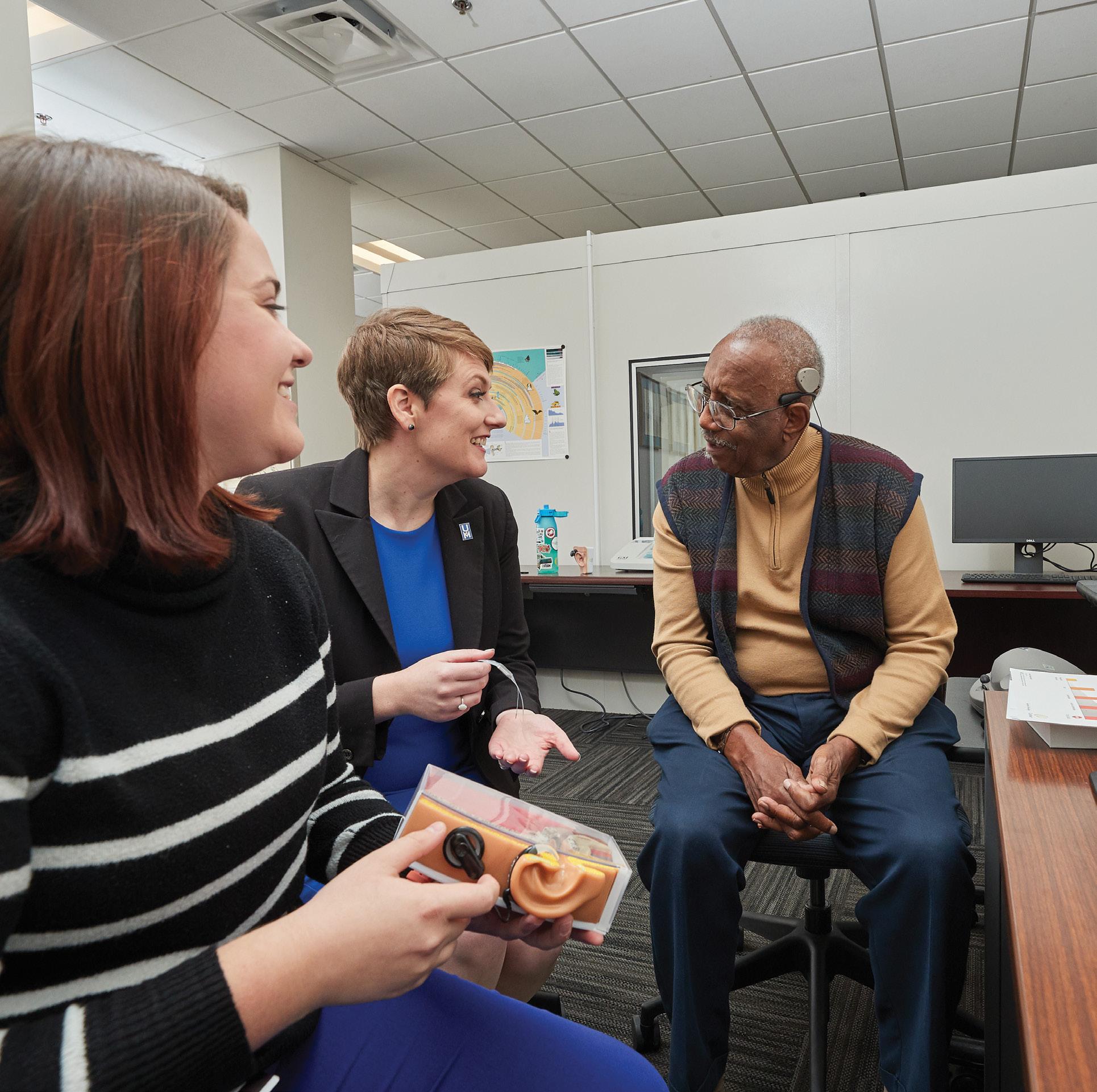
4 minute read
Auditory Cognitive Neuroscience Laboratory
HEARING RESEARCH
Gavin M. Bidelman, PhD is associate professor in the School of Communication Sciences and Disorders. Dr. Bidelman received his B.M. in Music Theory and his BS in Sound Engineering from the University of Michigan and a PhD in Hearing Science from Purdue University. He completed postdoctoral work at the Rotman Research Institute-Baycrest Centre for Geriatric Care in Toronto. He joined the University of Memphis faculty in 2012, where he directs the Auditory Cognitive Neuroscience Laboratory (ACNL). Dr. Bidelman holds a joint appointment with the Institute for Intelligent Systems and is an affiliate of the University of Tennessee Health Sciences Center Department of Anatomy and Neurobiology. Dr. Bidelman has published more than 100 journal articles on the relation between brain function and human hearing and is associate editor for the journals Frontiers in Neuroscience and Psychomusicology. His research has been funded by the National Institues of Health, American Hearing Research, American Academy of Audiology and GRAMMY® Foundations and has been featured in the New York Times and CBS News.
Research Interests Our research aims to understand the neurobiological underpinnings of speech and music perception and how the auditory system encodes and renders hearing behaviors. We study both normal auditory processing, the neural plasticity associated with different listening experiences (e.g., musicianship, learning, bilingualism) and hearing deficits associated with hearing loss and aging. A particular interest of the lab is to identify biomarkers that predict successful hearing in “cocktail party” environments (e.g., analyzing speech in noise). The lab uses an interdisciplinary approach to understand audition through a coordinated blend of techniques including neuroimaging (EEG/ERPs), psychoacoustics and computational modeling. Electrical responses are recorded from the human nervous system and “decoded” to decipher how brain activity relates to hearing skills. Studies also investigate the neurobiological relationships between music and language.
Current Research and Applications Translational applications of Dr. Bidelman’s research include novel signal processing and detection algorithms to accelerate clinical evoked potential testing, early identification of auditory impairments via objective brain indices and neurorehabilitation. Recent ACNL studies have demonstrated that early changes in the brain’s response to speech can be used as a biomarker for identifying mild cognitive impairment before the emergence of behavioral deficits. Bidelman’s research also suggests that musical training has a profound impact on brain function and can partially counteract the cognitive and auditory declines that occur later in life.
Future Endeavors Using novel electrophysiological methods developed in the lab, Dr. Bidelman and his colleagues are recording neural activity generated simultaneously from the cochlea, brainstem and cerebral cortex to identify emergent properties of auditory perception and map changes in neural coding that occur across the lifespan, with listening experiences and with novel learning. Simultaneous recordings of brainstem and cortical neural responses are detailing how the brain’s representations for speech change in impoverished auditory systems affected by sensorineural hearing loss and cognitive impairments. Collectively, Dr. Bidelman’s work demonstrates that auditory perceptual skills in normal and impaired hearing depend critically on how successful (or unsuccessful) information is transferred between different levels of the auditory system (i.e., functional
connectivity). In future directions of this work, Dr. Bidelman is interested in further examining brain connectivity and how it might predict individual differences in auditory learning in normal developing individuals and those with language-learning disorders. The lab is also beginning studies on multisensory processing to examine how hearing and vision are combined to assist speech perception in cocktail party scenarios.
Student Involvement Dr. Bidelman seeks highly motivated, intellectual students who are not afraid to ask questions. Students should be eager, motivated and passionate about investigating new lines of inquiry. Dr. Bidelman regularly collaborates with speech/hearing scientists, clinicians, engineers and musicians to understand

relations between brain and behavior as they relate to speech and hearing issues. Research topics are equally as diverse and address empirical questions on normal auditory function, speech-language processing, aging and hearing loss, and brain plasticity. Dr. Bidelman regularly advises research projects for doctoral students in the clinical AuD program and PhD students from other departments (e.g., psychology, engineering) and has actively published with his graduate students (more than 20 student articles in past five years). Students with multidisciplinary backgrounds (e.g., cognitive psychology, neuroscience, engineering) and those interested in acquiring neuroimaging skills to tackle novel research questions are encouraged to pursue training in the ACNL.
Publication Spotlight 1. Mankel, K. & Bidelman, G. M. (2018).
Inherent auditory skills rather than formal music training shape the neural encoding of speech. Proceedings of the National Academy of Sciences of the United States of America, 115(51), 13129-13134. 2. Bidelman, G. M., Lowther, J., Tak,
S., & Alain, C. (2017). Mild cognitive impairment is characterized by deficient hierarchical speech coding between auditory brainstem and cortex. Journal of Neuroscience, 37(13), 3610-3620. 3. Bidelman, G. M. & Howell, M. (2016).
Functional changes in inter- and intra-hemispheric auditory cortical processing underlying degraded speech perception. NeuroImage, 124, 581-590. 4. Bidelman, G. M., & Alain, C. (2015).
Musical training orchestrates coordinated neuroplasticity in auditory brainstem and cortex to counteract age-related declines in categorical vowel perception. Journal of Neuroscience, 35(2), 1240 –1249. 5. Bidelman, G. M. et al. (2011). Crossdomain effects of music and language experience on the representation of pitch in the human auditory brainstem. Journal of Cognitive Neuroscience, 23(2), 425-434.












